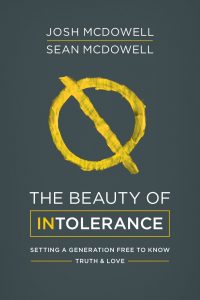
I’ll Decide My Own Truth
To be American is to embrace individual rights, right? Having been brought up to believe this, today’s young people are uncomfortable with the suggestion that there is only one universal truth. “You can believe that silliness,” they might reply. “But I’ll decide my own truth.”
Because Christianity appears exclusive, many young people are uncomfortable with it, too. They might think Jesus was a cool dude, but the whole hell thing is just too uncool, you know?
If they do profess to be Christians, they may be putting conditions on what that means to them. They may not, for example, put much stock in reading the Bible. Because isn’t it an old, dusty book?
God’s inspired word is timeless. And powerful. And the way that God has chosen to tell us how to live.
As we have said in previous blog posts, cultural tolerance propagates the view that all religious belief and moral truth claims are equal. That there is no creator, just science.
So, they say, each person gets to create their own personal truth. This subjective “truth,” they add, guarantees that everyone gets to live life on their terms, without judgment. In other words, “I am the boss of me, not you. Butt out, if you don’t like it.”
At the heart level, this sounds so attractive. But if we apply the brains God gave us, we recognize that this just creates a bunch of “truths.” What a mess.
When we follow God’s moral truth, however, we have a single standard defining right and wrong. God’s ways are good, and created for our good. God isn’t setting boundaries to be mean. He’s setting boundaries because he’s good and wants us to enjoy good lives.
Some, sadly, view God’s ways as “foolish” and restrictive. This isn’t surprising, as man has long rebelled against God. If our society continues to more fully embrace the notion that self and science trump God, the pressure to not live a life committed to God will become more intense. But choosing God is the most important decision we will ever make.
To live life without a relationship with God is, in my opinion, hell on earth. To not know him means that we miss out on the stability and joy he wants us to experience while we’re here. And we’ll miss out on heaven.
What the Bible Tells Us
Unlike us, God doesn’t waffle. Especially when things get tough. He doesn’t change his mind or behavior, like we do, to make life easier, win friends, or gain “stuff.” God is a solid rock. He can’t be bought. He can’t be manipulated. He never gets tired of us. Exactly the opposite: God yearns for us. So we can approach him with assurance.
We know these things because the Bible tells us so. We so often have to admit, “I don’t know.” But God knows all, sees all, and is in control of all. His word tells us so. God understands us and accepts us. The Bible tells us so. This crazy world is chaotic, but when we trust in God’s goodness and power, we can have peace. The Bible tells us so.
God gives us complete freedom to muck up our lives by rejecting him. If we don’t know the Bible verses promising God’s constant commitment to us, Satan can dribble the opposite into our ears and we’ll fall for it. Sin separates us from God, but only until we seek his forgiveness. His arms are always open to us.
Atheists and other detractors of Christianity often assert that Christianity is the root of all evil. “Look at the evil that’s been done in the name of God!” they cry. They’re right. Because we humans are messed up. And capable of horrible deeds, when we’re not committed to following Christ’s example of love and sacrifice.
But here’s some good news to counter their claims: it can be demonstrated that God’s mercy and justice as our model has provided more positive contributions to society in general than any other force in history. Hospitals, civic organizations, schools, even America’s founding principals of justice and civil liberties, can be attributed to individuals who chose to bestow love and compassion on others.
It’s when human greed and selfishness step forward that we begin to run amok.
It’s a Heart Issue
The core problem is our broken human nature. The gospel is actually the antidote to this. For it is only through transformation by the Spirit that our natures can be made new (2 Corinthians 5:17). The Bible reminds us to daily lay our lives down for others. To forgive. To be generous. To treat others with kindness. To love.
We must make regular bible study part of our lives. The Bible is full of stories of God’s redemptive nature. It’s the love story of God sending Jesus to reconcile us to himself. It offers unlimited wisdom on how we can deal with rejection, hurt, pride, fear, worry, and a host of other annoying human emotions. It teaches us how to trust in God’s goodness and strength, not ours.
So lead your family in loving God’s word. Help them to see that the Bible isn’t an antiquated book of stories, but a roadmap to joy, peace, and stability. That they can trust that even when they hit choppy waters, Jesus is already in the boat, ever ready to calm the storms.
Thought to Ponder
The Bible is God’s personal message that we matter. Discuss with your kids how the Bible helps us to know God, and to hear his truth. Even if your kids aren’t initially receptive to the bible’s importance, keep the dialogue going. Jesus never forced anyone to believe in him. Jesus drew people to him by accepting them, loving them, and continuously pointing them to God.
 This blog post has been adapted from the book The Beauty of Intolerance, by Josh and Sean McDowell.
This blog post has been adapted from the book The Beauty of Intolerance, by Josh and Sean McDowell.



